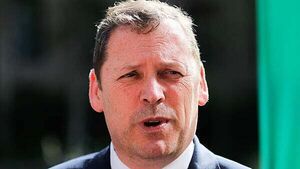Irish MEP part of delegation to visit India for talks on EU trade agreement

James Cox
Fianna Fáil MEP Barry Cowen will be part of a European Parliament trade delegation to visit India for talks later this month.
Mr Cowen, an MEP for Midlands North-West, will be part of the group as negotiations on a landmark EU-India trade and investment agreement reach an advanced stage.
The mission – organised by the European Parliament’s International Trade Committee (INTA) – will take place from October 27th to 29th and include meetings with India's minister for finance Nirmala Sitharaman; Dr S Jaishankar, minister of external affairs and Piyush Goyal, minister of commerce and industry.
EU representatives and industry stakeholders will also be in attendance. The agenda also features a field visit to Panipat, India’s textile recycling hub - an "opportunity to discuss sustainability and circular economy priorities within the talks".
Negotiations between the EU and India resumed in 2022 after an eight-year hiatus and are now edging toward conclusion.
Challenges
While significant challenges remain – including agriculture, tariffs on cars, wines and spirits, and India’s resistance to the EU’s Carbon Border Adjustment Mechanism – Mr Cowen said briefings have "signalled that progress is tangible".
Agriculture was formally tabled in the most recent round of negotiations last month, a sign the talks are entering their final phase.
A deal with India would be one of the most important concluded in recent years and would be seen as a significant and positive step in the context of global trade uncertainty following the introduction of wide-ranging tariffs by the Trump administration in the United States.
With India’s population of nearly 1.5 billion and its position as the fastest-growing large economy, the agreement offers "major opportunities for Irish industries".
These industries whiskey/spirits and dairy exports to pharma and nutrition products.
Mr Cowen said he has already engaged with representatives of the whiskey/spirits, dairy, pharma and medtech sectors and is well briefed on their priorities for the trip.
A deal would provide Irish exporters with improved access "to a vast and growing consumer market".
Irish industry
Mr Cowen cited Irish whiskey exports to India, which have grown tenfold in the past five years, while Irish dairy and nutrition companies face high tariffs that a deal could ease.
Companies like Glanbia see India’s growing protein and sports nutrition market as particularly promising if barriers are reduced.
Mr Cowen said: "I’m delighted to have been invited on this trip – recognition of the seriousness and productiveness I have approached trade issues with in recent months, in particular around the EU-US agreement.
“For me, this mission will be about strengthening economic and political links at a pivotal moment. A deal between the EU and India could open up enormous opportunities for Irish farmers and businesses – but it must be fair and sustainable. We need to defend high European standards while ensuring access to a fast-growing market.”
He added: “The fact that agriculture issues are now actively being discussed and ironed out shows the seriousness of the point that talks have now reached. As a full member of the European Parliament’s AGRI committee and someone in regular contact with farmers across Ireland, I’m well positioned to represent the industry’s interests in discussions. A deal would be good news for Irish farmers and agri-food producers, whether it is whiskey, spirits, dairy, beef or other high-value products. But it is also essential that Europe does not give away the protections that our farmers depend on.
“Ireland has a particular interest in ensuring that tariffs on our world-class food and drink exports are reduced. At the same time, Europe must hold firm on standards around food safety, sustainability and fair competition. India is rightly protective of its farmers – and we must respect that – but an ambitious agreement can work for both sides.”






